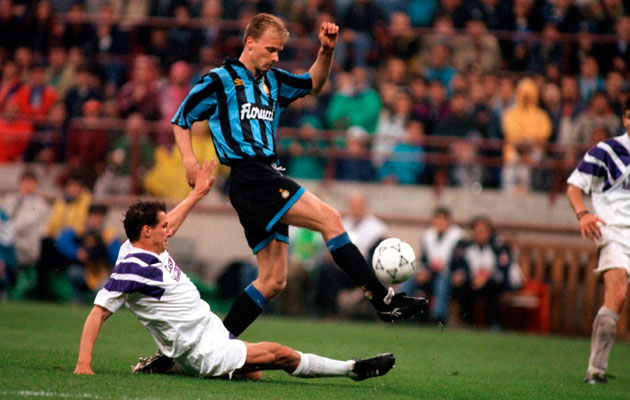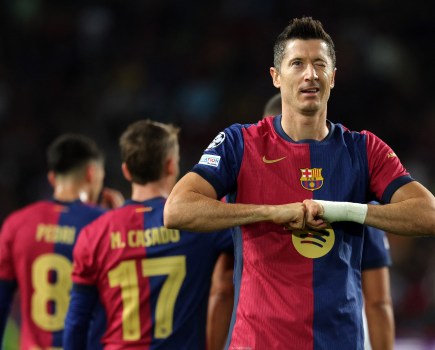When you think of Dennis Bergkamp numerous superlatives instantly spring to mind; perfectionist, genius, artist, visionary. You hear his name mentioned in conversation and your thoughts are sharply brought back to that defying-footballing-physics goal against Newcastle in 2002 or his three touch masterpiece vs Argentina at France ’98.
You flashback to the sumptuous spin-and-delicate-lob assist for Freddie Ljungberg against Juventus in 2001, to the seemingly endless supply of defence-splitting passes for Ian Wright, Nicholas Anelka and Thierry Henry. Dennis Bergkamp was a footballers’ footballer who played for the players as much as he did for the fans.
The term ‘donkey’, however, is one that nobody should ever associate with the Dutchman, yet for a brief period during his disastrous two-year spell at Inter in the mid ‘90s, things became so bad that the Rome-based publication La Repubblica renamed their ‘donkey of the week’ award for worst player to ‘Bergkamp della settimana’ (Bergkamp of the week). How could a player of his unquestionable talent be reduced to a punchline?
In 1993 Bergkamp was ready to leave Ajax, having been promoted from the youth team by Johan Cruyff in 1986. He believed the time was right at 24 to seek fresh pastures and felt he had hit his ceiling within the confines of the Dutch game and let the directors at Ajax know during the winter break of the 1992-93 season that this would be his final campaign, giving them ample time to find a replacement.
Cruyff, knowing full well the stark contrast between the countries’ footballing philosophies, pleaded with him not to leave Holland for Italy, but rather urged to follow him to Spain, and more specifically to Barcelona were his ‘Dream Team’ were in the midst of their golden age. Bergkamp, quick to comprehend that with the three-foreigner rule in La Liga and Hristo Stoichkov, Ronald Koeman and Michael Laudrup already at the club, he wouldn’t be guaranteed a starting position at the Camp Nou.
His mentor’s pleas fell on deaf ears as Bergkamp had his eyes on only one league, Serie A, comfortably the world’s most daunting for attacking players. He had begun to take Italian lessons a year beforehand in preparation for the move. ’’For a long time my heart was set on Italy because it was absolutely the best football country then. Italy, Italy, Italy… it’s all I was thinking about.’’
In his autobiography ‘Stillness and Speed’ Bergkamp claimed that while a lot of Italian clubs showed interest in him however it boiled down to a choice between Juventus and Inter. He ruled out Milan as he wanted to traverse down his own path and not follow the Dutch trio of Van Basten, Gullit and Rijkaard, he recalls ‘’I was thinking, I can go for the comfortable options of Milan or Barcelona, or I can make my own adventure.’’
How a potential Bergkamp-Baggio dynamic would have worked at Juve is open to debate. While looking tantalisingly mouthwatering on paper, anyone who has done research on the pair realises they share a similar outlook on how the beautiful game should be played, and despite Bergkamp being ostensibly perceived as a goal scorer at the time, they would have been vying for the same pockets of space on the field and in all probability wouldn’t have worked together.
It mattered little as Juve made Bergkamp’s mind up for him after receiving a phone call from his agent and brother, who looked after Bergkamp’s career, relaying the message that they “didn’t get a good feeling” following a meeting with the Bianconeri’s head honchos. Upon hearing this, Bergkamp decided to go with Inter’s offer.
Unbeknownst to Bergkamp, he was about to enter a country that, according to Tommasso Pellizzari of the Corriere Della Sella, was deep in the middle of a ‘religious war’.
Arrigo Sacchi’s all-conquering, all-consuming-yet-swashbuckling Milan side had forced the Italian population, pundits and journalists included, to contemplate over the cultural future of their football. Sacchi’s four-year spell at Milan had proved to the Italian coaches who valued defensive solidarity over aesthetics, that it was possible to be successful whilst playing beautiful football.
The question was; should Italian teams continue down the road Milan had navigated whilst betraying their beliefs or stick to their own identity, that while not attractive, had a legacy of results and trophies?
In 1990, Juventus hired Luigi Maifredi on the back of a successful three-year stint at Bologna. Maifredi, whose style of football was dubbed ‘calcio champagne’, had just finished 8th in the 1989-90 season and got the Rossoblu into the UEFA Cup. Having signed Roberto Baggio before Italia ‘90, it was hoped Maifredi, together with Baggio, would usher in an exiting new style of play for the Bianconeri.
Maifredi’s tenure was disastrous and lasted one season before receiving his cards, Juve finished 7th and wouldn’t play in Europe for the first time in twenty-eight years. Who replaced him? The ever-pragmatic Giovanni Trapattoni, Juve’s experiment with eye-pleasing football lasted all of a season.
Zdnek Zeman’s Foggia were winning plaudits for their adventurous play, using a 4-3-3, Zeman very nearly achieved a minor miracle in qualifying for the UEFA Cup in two occasions, ultimately falling short by 3 points each time.. Yet the majority of coaches in calcio still believed in the philosophy of defensive-security first and foremost; why change a mentality that had a history of success and was so deeply entrenched in the national psyche? Obtaining the result was all that mattered, if you wanted entertainment, go to the theatre, was the general assertion.
Ernesto Pellegrini, Inter’s president, wanted to emulate the success of Sacchi and Berlusconi by changing the style of his sides’ play. He first hired Corrado Orrico in 1991, who was viewed as Inter’s answer to Sacchi, Orrico had performed admirably with little Lucchese in Serie B playing attacking football. However Orrico was a bust at Inter as he tried to implement a zonal marking system to veterans such as Guiseppe Bergomi and Riccardo Ferri, who, brought up on man-marking, couldn’t acclimatise. According to Bergomi ‘’we were even failing to beat Serie C teams during pre-season.’’ Orrico was sacked halfway through the 1991-92 season and Osvaldo Bagnoli took the reins in the summer of 1992.
This was the landscape of Italian football in which Bergkamp was about to arrive.
In early 1993 Pellegrini flew to Holland to meet with Bergkamp to convince him to join Inter. Bergkamp, also eager to hear the plans for the team before putting pen to paper, was promised the philosophy of the team would change. Inter would play a pressing game he was told by the president.
On February 16, 1993, Pellegrini announced that he had bought both Bergkamp and Ajax teammate Wim Jonk for a combined fee of £10.4 million. It was seen as a major coup for Inter. They would join following the conclusion of the current season. Before Bergkamp had even kicked a ball for his club, Pellegrini heaped the pressure on his new signing by declaring that Bergkamp was ‘the best no.10 in the world’.
Under Bagnoli Inter had finished in a highly unexpected second place in 1992-93, falling four points short of Fabio Capello’s Milan. With the purchases of Bergkamp and Jonk, coupled with Milan’s Dutch trio now consigned to the history books following the departures of Gullit to Sampdoria, Rijkaard to Ajax and Van Basten’s tragic battle with injuries. Pellegrini felt a little sprinkling of Dutch magic could deliver Inter their first title since 1989.
Bagnoli, the architect of Verona’s famous Scudetto in 1985, had achieved second place with what was the common tactical template in Italy at the time; sit deep and hit on the counter. He used the lightening pace of Ruben Sosa to great effect; the Uruguayan scored 20 goals in 1992-93.
The seeds of Inter’s abysmal 1993-94 season were sown as early as pre-season. Bagnoli makes the claim that Pellegrini never relayed any message about changing the system, and the new season commenced with a style of play that was unchanged from the previous campaign. Bergkamp became immediately isolated on the pitch with little support from Inter’s midfielders. “I’d be up there with (Ruben) Sosa and every game we’re up against five defenders.”
They began the season indifferently but were making strides in the UEFA Cup with Bergkamp seemingly an invigorated player in the tournament. He netted a hat trick (including a brilliant scissor kick) against Rapid Bucharest in the first round and put Norwich City’s European adventure to the sword with a goal in either leg in round three.
In the defensive quagmire of Serie A, Bergkamp and Inter were floundering in Bagnoli’s counter-attacking system and he argues that he couldn’t have succeeded under the coach’s stringent tactics.
“I’d be up there with Sosa and let’s say two midfielders have joined the attack as well…I look back and my defenders and other midfielders are still deep in their own half! There’s a huge space between us and it’s dead space! It’s killing me, it’s killing the team.”
To compound the issue, off the pitch he was struggling too, very much an introvert, he had a hard time integrating himself within the Inter locker room. Both interviewed for his book, Bergomi and Ferri were critical of his unwillingness to socialise with his teammates. Ferri was most vocal, “we found him rather cold. Everyone in the team tried, but he was quite cold.” Bergomi was more diplomatic stating that “Dennis could have done more to adapt, to become more Italian.”
His partnership with Sosa, which wasn’t working on the pitch, became more complicated when the Uruguayan described Bergkamp as “strange and solitary” and that he “does not laugh, does not speak and I will not ever pass him the ball” to the Italian media.
If the diminutive Uruguayan’s explosive pace and head-down style of dribbling was perfectly suited to Bagnoli’s game plan, Bergkamp’s sublime vision wasn’t. If Bergkamp needed collaborators in order to shine, Sosa was undoubtedly a soloist; their partnership was always destined to fail.
Bagnoli was sacked after a 2-1 loss at home to Lazio in February 1994 and was replaced by Giampiero Marini, who proceeded to only win twice in the remaining twelve league games as they narrowly avoided relegation by a single point. Yet their season ended in glory as they beat Casino Salzburg over two legs to win the UEFA Cup with Bergkamp ending as top goalscorer with eight goals.

If Bergkamp’s first season at Inter was tough, his second, and ultimately last, was even tougher. Pellegrini hired former Napoli manager Ottavio Bianchi, who Bergkamp says mentioned his association with Diego Maradona “a few times…every hour,” that Bergkamp felt was disrespectful to his current players.
He talks about a scene in which Bianchi was walking with his assistant to play tennis in between training sessions. To get to the court they had to walk past the training ground and two pitches, Bergkamp observed Bianchi walking with just his phone in his hand whilst his assistant, who was a few years older, was carrying both rackets, four bottles of water and a bag. For Bergkamp this was unacceptable behavior and lost all respect for Bianchi that day.
Bianchi did however, showing that he had more authority than Bagnoli, attempt to alter Inter’s style of play. He instigated a pressing game in two pre-season games ahead of the new season and then promptly switched back. Claiming it couldn’t work.
Suffering with injuries and burn out from USA ’94, Bergkamp endured a horrid season, scoring only four goals from all competitions, ironically his last goal for the club was in the San Paolo – the scene of Bianchi’s greatest triumph and much the source of discontent between the pair.
Bianchi had steadied the sinking ship but the relationship with the Dutchman was beyond repair. Bergkamp’s relationship with the Italian media had now turned hostile; with them alleging that he was suffering psychological problems that ‘resulted in hair loss’.
In June 1995 Bergkamp sent his agent to talk to Inter’s new owner, Massimo Moratti and gave him a choice; either Moratti sacked Bianchi and brought in new players or Dennis would have to leave. Moratti, buoyed by Bianchi’s 6th place finish, told his agent that he was sticking with the coach. Bergkamp, who by his own account was ‘‘really quite broken’’ at this point in his career and had considered retiring, joined Arsenal weeks later.
Bergkamp, by not betraying his principles of the Dutch philosophy, knew he was never going to succeed in Serie A. Whereas Franco Baresi, Paolo Maldini and co all embraced a new style of play under Sacchi. Bergomi, Battistini and Ferri were unwilling or simply couldn’t adapt to a change of system at Inter. The crux of the matter was that Bergkamp unfortunately was caught between Italy’s past and it’s future, between the traditionalists who felt threatened by change and the modernists who tried to apply it.
Serie A’s loss was ultimately the Premier League’s gain, where Bergkamp, together with Arsene Wenger, changed not only a club but an entire league.
By Emmet Gates
This article originally appeared in In Bed with Maradona








